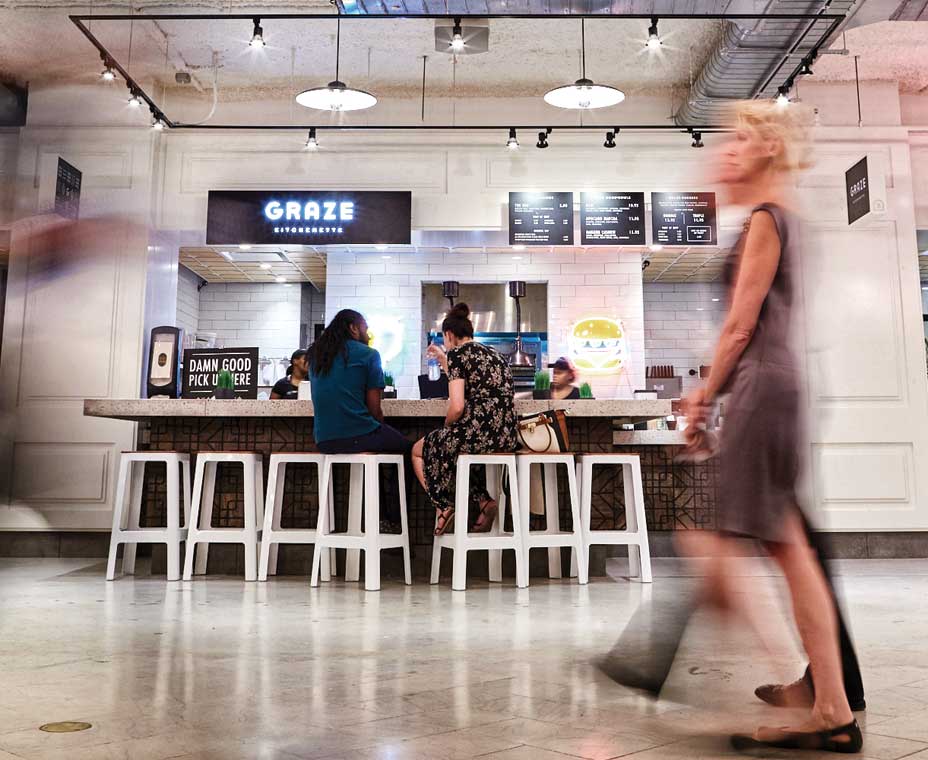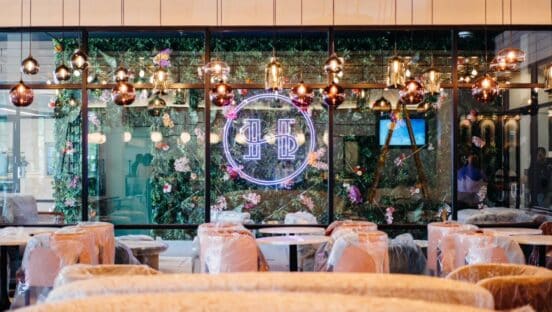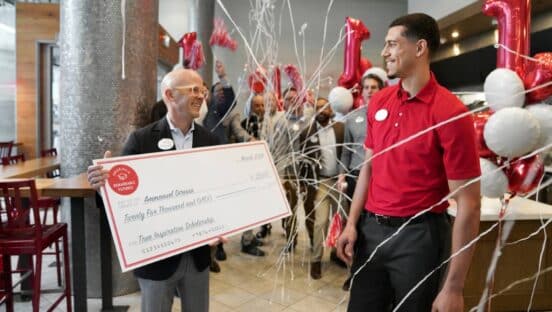Food halls are taking the nation’s cities by storm, providing locals with a central location for dozens of innovative concepts. And chefs and other full-service professionals are taking advantage of the trend, leveraging food-hall space to try out either limited versions of their full-service menus or big quick-serve ideas they’ve developed over the years.
Chicago’s Mason Edelson and Sarah Jordan represent both sides of that token, and paired up to open a food-hall interpretation of the classic diner.
The two veterans of the fine-dining scene opened Graze Kitchenette in the Windy City’s popular new Revival Food Hall, dishing burgers inspired by those served at Jordan’s Logan Square diner Johnny’s Grill and smoothie bowls that Edelson had long wanted to build a concept around. Packaged into a small, brightly lit space in the vast Revival hall, Graze Kitchenette presents a modern diner vibe for on-the-go guests, complete with an abbreviated granite counter and a handful of bar stools.
“The idea on the burgers is there’s a little bit of a chef-driven twist, a contemporary take, but still sticking to that true diner feel,” Edelson says. “Then the bowls are kind of a milkshake replacement, so they are more of a healthy, contemporary, modern, chef-driven option than a milkshake. The two seem opposing, but they’re also complementary, and we’re sticking to that contemporary diner feel.”
Graze offers single and double burgers, featuring grass-fed beef, cheddar, pickles, onions, and dijonnaise on a brioche bun. Guests can then add a variety of ingredients, such as avocado, jalapeños, and an egg. There’s also a Breakfast Sammie and a Tofu “Patty” Melt on the menu. Meanwhile, the bowls feature a granola base along with various mix-ins; options include the Avocado Matcha with mango, coconut, goji berry, and lime, and the Banana Cashew with maca, goji berry, lime, coconut, cacao nib, and hemp seed.
“We market directly to the clientele who is purchasing these bowls, so they’re more of a fitness-friendly, health-conscious, millennial market,” Edelson says.
While Jordan brings culinary panache to the Graze menu, Edelson’s past experience is as a maitre’d and certified sommelier. That experience helps to bolster Graze’s hospitality quotient, which he says the team tries to make a competitive advantage by creating strong front-of-house service. This is done through rapport with customers, he says, adding that he trains staff to get to know the names and orders of regular customers.
“At a full-service restaurant, you have the ability to essentially win the customer over a two-, three-hour period, and you have time to get to know them and they have time to get to know you,” he says. “With quick service, you have five minutes to get to know the customer; you have five minutes to please them; you have five minutes to figure out what they like and make them happy.”
Edelson and Jordan met while both worked for GT Fish & Oyster, part of the Boka Restaurant Group in Chicago. Edelson was maitre’d, while Jordan was the pastry chef. After Jordan, who opened Johnny’s Grill in 2015, was offered a spot at the project that was to become Revival, she invited Edelson to join with the smoothie-bowl concept.
Graze was the only concept that didn’t previously exist before Revival Food Hall opened in August; the other 15 stalls include some of Chicago’s best-known brands, such as Antique Taco, Smoque BBQ, and Hot Chocolate.
Edelson says Revival has been a great opportunity to workshop the Graze idea, and there are plans to expand beyond the food hall, specifically showcasing the smoothie bowl. “Right now this is kind of a test location to see how well the bowls would do and how well the public would react to this kind of concept,” he says. “We want to continue to build our following so that when we do expand, we’re starting off on a high note.”
As for the burger side of things, he says, the door is open to expansion as well. But he and Jordan want their burger to be better known throughout Chicago before growing, as that will limit the risk in investing in a burger joint in a saturated market.
Even though his résumé includes stops at multiple full-service restaurants, Edelson has wanted to dive into the limited-service world for a while. He says the opportunity to bring high-quality food to a wider swath of people is an attractive proposition in today’s foodie-forward foodservice climate.
“That was my personal intention originally with the bowl concept: something that’s small, something that’s high-volume, yet something that still has chef-driven quality background,” he says. “To me that’s more accessible, and that’s how you can serve more people. And I think that sticking to quick service is a lower-cost way to still operate a restaurant without taking on the huge investment of a full-service sit-down standalone.”
But the considerable cost associated with opening a full-service restaurant isn’t the only reason Edelson is interested in investing in limited service.
“Personally, I think it’s more fun to work on the fast-casual side of things,” he says. “Not everybody takes things so seriously, and there’s more of a light-heartedness involved.”




